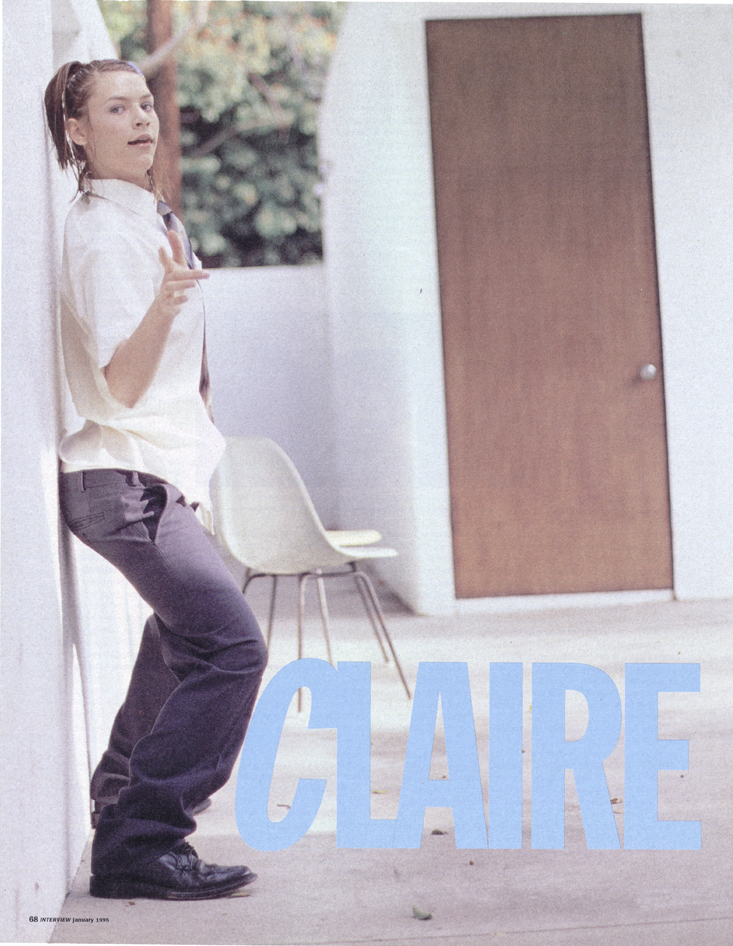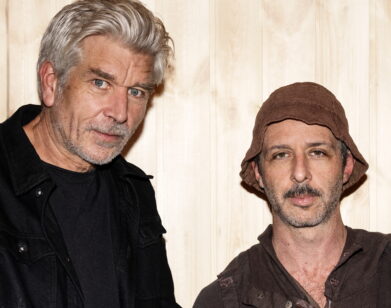New Again: Claire Danes
In New Again, we highlight a piece from Interview’s past that resonates with the present.
Whether the blonde bob was faux or not, Claire Danes looked as gorgeous at the 2013 Emmys as she was adorable circa 1995. On Sunday night, the now 34-year-old actress received her second Emmy for Best Actress in a Drama (this time for Homeland), bringing her total Emmy count up to three. But the red carpet is nothing new for the seasoned star. Danes made a name for herself in the mid-’90s as angsty Angela in My So-Called Life and, at the delicate age of 15, won a Golden Globe and received her first Emmy nomination. Naturally, we were slightly nostalgic and wanted to revisit the younger Danes, with her shimmering lip gloss and hair slicked back in blue and yellow plastic barrettes. In our January 1995 issue, Danes spoke to us about everything from her budding acting career to fretting about zits and a nonexistent sex life, while Spike Jonze photographed away. —Emily McDermott
Claire Danes: Start remembering her name—you’re going to need to know it.
By Mark Marvel
CLAIRE DANES: My name is Claire. I’m 15 years old. I grew up in New York, on Crosby Street in SoHo. Nobody else in my family acts.
MARK MARVEL: So how did you get involved in acting?
DANES: It’s kind of a long story: I guess everybody has a long story. I’ve danced since I was a little girl—modern dance. I did a few artsy-fartsy dance performances on the Lower East Side and that got me started performing. Then I went to the Lee Strasberg Theater Institute when I was 11, and I learned more about what acting was and I loved it. Then I went to this brand-new performing arts junior high because I hated my elementary school and I wanted to get out.
MARVEL: Do you empathize with your character, Angela, in My So-Called Life, because she hates school, too?
DANES: Well, yeah. When you’re a teenager it’s hard not to empathize with that. But Angela is a really hard role because she talks about ideas that I myself haven’t yet sorted out. So it’s sort of—
MARVEL: Method living.
DANES: Yeah, it’s like picking at this open sore. That sounds a little dark, but it’s true.
MARVEL: What was it like to play a teen from another time in Little Women?
DANES: I had to do a serious switching of gears from this ’90s grunge chick, whatever that means, to this homey, saintly character. It was fun to finally dip my feet into some new waters because I had worked so long on My So-Called Life. But Little Women really isn’t about being a teenager; it’s more about the relationships between the sisters and being a family. A huge part of my role in the movie is that I die, which was a pretty intense experience. I didn’t expect it to be as hard as it was. I would change into this scarlet fever makeup in the trailer and it was really upsetting. I remember walking onto the set for the first time that way. The crew would whisper when they were around me. They’d open doors for me. It was hard for my mom to look at me like that, and hard for me, too. I did looping a few weeks ago, and I was in there for, like nine and a half hours looking at myself sick and dying. I left all shaken up that day.
MARVEL: Death isn’t something teenagers often think about.
DANES: At every stage in life you think about death. But teenagers especially are sort of invincible. They’re not supposed to be thinking about dying yet, or else they’d be too afraid to live. Beth’s regarded as the weak, frail sister, though in a lot of ways she supports the rest of the family—especially Jo, which is ironic because Jo is the outgoing, brave, strong one.
MARVEL: What was it like to discover through Beth such a different period in the lives of women?
DANES: When we started, I didn’t know anything about that time period. I’d read the book. They gave us this little pamphlet of mannerisms and rules of etiquette. I thought, “Shit, do I have to read this whole thing? Do I have to memorize all of this?” Like, you can do a million things with a fan at a party, and there are all these flirtation signals. Women had to sit up straight all the time and wear corsets. And I’m thinking, How brutal to live like that. It’s great to know that we’ve come this far, although we have a lot farther to go. As with any kind of prejudice, we’re not even aware of half of the levels to it. If we knew how women were discriminated against, we might be able to solve the problem.
MARVEL: It must give you a new understanding when you do a movie that lets you see the roots of some of that.
DANES: I learned a lot doing this movie. And I felt really lucky working with such a strong group of women.
MARVEL: What did you learn most about yourself?
DANES: God, that’s a heavy question. It gave me a new appreciation for people like Beth, who are overlooked and underappreciated. When I first walked into Little Women, I was saying, “How am I going to play Beth? I don’t have anything in common with this character.” As the shoot continued, I learned more about her and more about myself. And I realized that we’re similar in certain ways.
MARVEL: How?
DANES: I never thought of myself as shy, and then I realized I am kind of shy: I’ve just built defenses to hide it. Beth also has a maturity, which I think I have, and maybe I brought that to her—this understanding about her family and how it works. She’s perceptive, and I’m perceptive. But the thing that I really respected about Beth was her generosity toward other people, which I wish I could have more of. People have asked me if I would hang out with Angela is she were real, and I don’t know if I would, yet I find solace in her, and we’ve gotten close in a lot of ways. It can be so lonely when I work. There aren’t many kids my age, besides the people on the show, that I hang around with. I’m close to them, but sometimes it doesn’t cut it as a social life. So Angela does become my friend, you know?
MARVEL: What do you think about the way teenagers are represented today—you know, the Generation X thing?
DANES: Well, what do you think that image is? The slacker thing? Or having no hope? Or being cynical? I think people of my generation are really worrying about their zits and getting that date for Friday night. I think that’s their reality. I don’t know if they’re worrying too hard about their future.
MARVEL: Is that stuff you worry about yourself?
DANES: What, zits and if I’m going to get that date? Oh absolutely, and thank God I do. It proves that I’m normal. But I’m constantly analyzing being a teenager. Every week I have to look in the mirror of the show. When I was a little girl, I worshipped those John Hughes movies, like Sixteen Candles and The Breakfast Club; Footloose is still one of my favorite movies. I was fascinated with teenagers, and I wanted to be one so badly. And here I am sort of living in one of those movies!
MARVEL: Do you think it’s a good time to be a teenager now?
DANES: It’s an exciting time. But I also think people are afraid somehow. This sort of a scary time—with AIDS and all this technology, and the media and everything.
MARVEL: Scarlet fever was an equivalent to AIDS at the time of Little Women. Even at 15, you have to think about AIDS now.
DANES: Yes, but I don’t deal with it directly. I’m not even having sex yet. But it is this overlying cloud or fear that surrounds you. It’s there in the back part of my head.
MARVEL: Talking about fear, do you ever get the feeling that adults are scared of teenagers?
DANES: Yes, in the sense that their kids are finally thinking for themselves and becoming less dependent and likely to do something different. Teenagers have this intense energy that can’t be touched and is so specific to that age. It’s very powerful, I think, and frightening to adults. There might also be a tinge of jealousy, because teenagers have these healthy bodies and they’re ready to attack the world. That can be threatening. Change is scary, and most adults don’t quite trust that.
MARVEL: Has your life changed?
DANES: It’s taken this huge 180-degree turn overnight, it seems. When I started My So-Called Life, my family and I moved across the country. I left all my friends behind and now I’m living this strange life in a bubble. I’ve gotten close to a whole new group of people. A lot has happened, and I’m still digesting it all, but it’s good. I wanted it all to happen and I’m so thankful I’m having a break from high school. Working gives you this new perspective. You don’t take everything too seriously and you realize that if you don’t do too well on a history test it’s not the end of the world. But it also gives you this distance from other kids, which is sad, because it’s like a point of no return. Now I feel more different than I already did.
THIS ARTICLE ORIGINALLY RAN IN THE JANUARY 1995 ISSUE OF INTERVIEW.
New Again runs every Wednesday. For more, click here.







